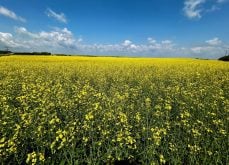SASKATOON — Canada’s canola processors have been blindsided by proposed amendments to California’s Low Carbon Fuel Standard.
“We’re surprised and disappointed with what they’re proposing,” said Chris Vervaet, executive director of the Canadian Oilseed Processors Association.
Related stories:
The California Air Resource Board (CARB) published its proposed amendments Aug. 12.
Read Also

Canola oil transloading facility opens
DP World just opened its new canola oil transload facility at the Port of Vancouver. It can ship one million tonnes of the commodity per year.
They include a 20 per cent cap on the amount of biomass-based diesel (biodiesel and renewable diesel) that can be made from soybean and canola oil.
“It’s very concerning, especially because there is room for growth in the California market,” said Vervaet.
“If you put caps in place on feedstocks like soybean and canola oil, that really limits those opportunities.”
There was no consultation about the proposed amendments, which have been in the works for a couple of years.
And he can’t see any rationale or scientific justification for the cap in the accompanying documentation.
“It does set an unjust and perhaps a risky precedent going forward in other markets as well,” said Vervaet.
The cap would be grandfathered in for any fuel producers currently producing more than 20 per cent of their biodiesel and renewable diesel using soybean and/or canola oil. They would have until Jan. 1, 2028, to comply.
For all other new and existing producers, the cap would apply upon the effective date of the amended regulation, which is expected to be some time in the first quarter of 2025.
California is the behemoth in the U.S. biomass-based diesel market, according to a recent report by the U.S. Department of Agriculture’s Foreign Agricultural Service (FAS).
“California is the largest-consuming and fastest-growing state and is responsible for driving the meteoric ramp-up of renewable diesel capacity and production,” stated the FAS.
The state’s voracious appetite for biomass-based diesel is one of the reasons behind the huge expansion of Canada’s canola crush sector.
The U.S. accounted for 91 percent of Canada’s canola oil exports in 2023, according to the FAS report.
Vervaet said there appears to be a policy shift occurring in California away from biofuel.
“There seems to be a clear interest amongst the regulatory community in California to lean on EVs (electric vehicles) to perhaps pick up the slack,” he said.
He questions the ability of electric vehicles to make inroads into the modes of transportation that use biodiesel and renewable diesel as quickly as the CARB timelines suggest.
Canada’s canola industry intends to provide a written response to the proposals by its Aug. 27 deadline for public comment.
That response will express disappointment with the proposal and underscore the lack of scientific rationale.
Clean Fuels Alliance America also expressed disappointment with CARB’s proposed amendments.
“Limiting biodiesel and renewable diesel in favour of technologies that will not be fully scalable for many years, even by CARB’s own projections, threatens both environmental progress and innovation,” the group said in a news release.
More than three billion pounds of soybean oil and 1.7 billion lb. of canola oil were used in California last year, with biomass-based diesel now accounting for 73 per cent of the state’s diesel pool.
“These proposed amendments impose significant restrictions on vegetable oil feedstocks, hindering the ability of clean fuels to effectively decarbonize the heavy-duty transportation sector,” said Jeff Earl, director of state governmental affairs with the alliance.
“These changes unjustly penalize biodiesel and renewable diesel, low carbon fuels that provide immediate health benefits for California.”
Dennis Voznesenski, agricultural economist with the Commonwealth Bank of Australia, believes the vegetable oil cap would encourage the use of waste products such as used cooking oil (UCO) and tallow.
“The problem is that the current availability of both UCO and tallow wouldn’t be sufficient to cancel out how much canola and soy oil would no longer be used,” he said during a recent podcast about his Agri Commodity Weekly Alert.
He noted that the U.S. government is currently investigating potentially fraudulent Chinese UCO, so supplies may soon be getting smaller.
Voznesenski said California’s proposals could restrict sales of Canadian canola into the U.S. market, forcing it into other world markets where it will compete with Australian supplies.


















